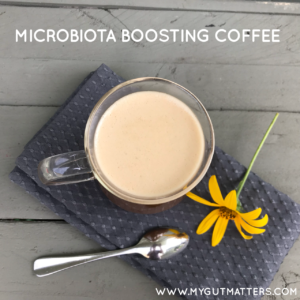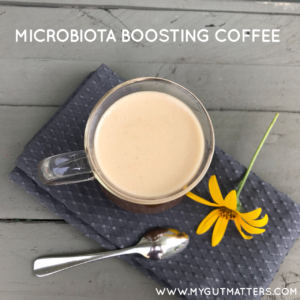What are prebiotics and why should we consume them?
Prebiotic is a food ingredient that enhances the growth of beneficial bacteria and contributes to our health. Historically different types of oligosaccharides were considered to be prebiotics. Mother nature designed us that way so our bodies do not have enzymes that can digest these complex oligosaccharides. Homo sapiens (Human being) is not genetically equipped with these enzymes encoding genes. However microbes residing in our guts produce a variety of enzymes that can break down these very complex sugars. This is a perfect examples of why we live in synbiotic relationship with microbiota. One of their functions is to help us digest the food we eat. Not to mention all the other benefits these bacteria provide.
Do not confuse prebiotics with fiber. Prebiotics practically always can be called fiber, however not all fiber can have the function of prebiotics. Basically not all fiber can support the growth of good bacteria. An average person is recommended to eat 28 (female) to 35 (male) grams of fiber a day. You can certainly consume more than that. The more the better for your microbiome. However, most of Americans barely eat 10 g of fiber a day. You can actually track your diet using one of those calculators like My Fitness Pal or My Food Diary or any other tracker and see how much fiber you are eating on a daily basis. When you start tracking you will realise that it maybe quite a challenge to consume 30 g of fiber a day!
The most recent and largest microbiome study performed by Dr. Rob Knight’s researchers demonstrated that those people who ate 30 different types of plants each week had more diverse microbiome than those people who ate only 10 different types of plants a week. So the takeaway from this research is that if you eat 30 different vegetables a week your microbiome will more likely be in a good shape.
It is a well known fact that certain plants have more or less of those oligosaccharides. For instance, jerusalem artichoke (also known as sunchokes), raw onions, garlic, green bananas, konjak root and other root vegetables may have quite a bit of inulin in them. Inulin is a well described prebiotic that increases the numbers of Bifidobacteri and Lactobacilli in the colon. Therefore it is important to add those in your diet on a regular basis. And if you cannot use them frequently in your diet for one reason or another you may want to add them as supplements. You can find some of the probiotics I recommend in my affiliated store on this blog.
I am a strong believer that prEbiotics are as important for our microbiome as prObiotics themselves. Actually they might even be more important. And here is why? Something has to feed the microbiome in your gut so if the foods you are consuming are low in fiber probiotics themselves might not do a trick you want them to do. They need food to do their job! And this food is FIBER and PREBIOTICS specifically! Also if your microbiome diversity is pretty high but the microbes are out of balance, this could be caused by the diet and prebiotics may help restore this balance.
So when I tracked my own vegetable consumption I realised that my family is buying and eating the same type of vegetables every week . And I will be entirely honest with you. The number of those vegetables was way below 30. And on some days I hardly reached 20 g of fiber per day so I had to figure out how to add some extra.
Why prebiotic coffee?
Prebiotics come mostly in a powder form and it maybe quite challenging to get an adequate amounts of probiotics in this particular form. It is much easier to drink a tablet or a capsule. But what can you do with 10-15 g or more of powdered fiber? You can add some to smoothies if you are fan of those and juices (but those are full of sugar!). A close friend of mine shared with me a recipe of bulletproof coffee. It’s a type of coffee that gives you even more energy and helps your brain to work better especially you are not in the mood for food but a fan of a cup of coffee. I can’t say I loved it when I tried it first. But after I complemented it with prebiotics to boost my own microbiome I fell in love with it. I shared this idea with other people and they absolutely loved it. Plus it helped many of those who tried with different digestive issues like constipation to give you just one example. So I had to write a separate post about it!
You may also ask if coffee is healthy at all? The most recent research suggests that coffee drinking may extend your life. There is also more evidence that drinking coffee may decrease the risk of heart disease and type 2 diabetes. This scientifically legit information makes me feel much better about drinking my coffee every morning!
Now, how do you prepare what I call MICROBIOTA PROMOTING PREBIOTIC COFFEE?
Here is what you will need for making one:
☕ Prepare a fresh cup of your favorite coffee. Ideally you want to know where the coffee beans came from and how they were grown. I often get this one. You can use french press to prepare your coffee or any other way you prefer.
☕ Add 1 teaspoon of ghee butter (or clarified butter) and 1 teaspoon of of MCT oil. I like vanilla flavour of the ghee however you can use any ghee you like even homemade. Just make sure that you are using grass-fed butter for preparing it. Grass-fed butter has more omega-3 oils in it and contains Vitamis A, E, D and K12. Our brain is made out of fat so it makes sense that it needs fat to maintain its health. We know that omega-3 is good for brain function, immune system function and it also benefits microbiome. MCT oil increases brain metabolism and thus its’ cognitive function in Alzheimer’s Disease. Considering their is a fat free movement couple of teaspoons of healthy oils may be beneficial.
☕ Add 1-2 table spoons of collagen. It is supposed to not only help with gut issues but may be good for skin, nails and hair. I think it is a multinational thing to make a very thick chicken broth when you are sick. My grandma used to make it. So if you are not a fan of such soups then supplementation maybe an alternative way to get collagen. Recent clinical study demonstrated that oral supplementation of low molecular weight collagen peptides are helping with skin hydration, elasticity and wrinkling. I will take that! There is also an ongoing study looking at how supplementation with collagen protein may affect skeletal muscle mass among the senior population.
☕ 1 table spoon of acacia fiber powder. This prebiotic promotes the growth of Bifidobacteria and Lactobacilli in human gut as some known fructooligosaccharides. Here is the most recent study describing the fermentation of acacia gum by Bifidobacterial and Lactobacillus species.
☕ 1 table spoon of inulin. Inulin is probably the most researched prebiotic outthere at the moment. It is absolutely safe to give to kids and adults. This prebiotic is known to have bifidogenic effect. It means that it is mostly promoting the growth of Bifidobacteria in our gut. Most fermented foods do not have Bifidobacteria, so to increase their numbers in the intestines you need to eat food that will also feed Bifidobacteria. And inulin is exactly that! If you think you do not have enough Bifidobacteria in your gut you can also supplement it with such probiotics as Align and/or Bifidus Balance. There is a lot of research that shows how beneficial inulin is. For example, in addition to promoting Bifidobacteria inulin also helps with increasing number of Akkermansia muciniphila, recently described bacterium that is involved in gut barrier function. Inulin also improves the dysfunction of endothelium and thus can potentially be helpful in cardiovascular disorders. It improves the diabetes profile and has many other benefits.
☕1 scoop of prebiotic fiber mixture, which variety of different probiotics including xylooligosacharides and isomaltooligosaccharides. Remember, that variety of microbiota is the key to a great health. Therefore variety of different types of fiber will help you achieve a better diversity of your gut microbes.
☕ 1 tea spoon of arabinogalactan, extracted from larch tree (Larix laricina). Arabinogalactan is Arabinogalactan is a different type of polysaccharides in plants, which is composed of D-galactose and L-arabinose with highly branched chains. It is present in seeds, carrots, root vegetables, soybeans and even medicinal herbs. Arabinogalactan has been shown to strengthen immune system, have anti-cancerogenic properties, reduces blood sugar in diabetics, helps with pain and even help with couphing. In addition to all the above it also has prebiotic properties. It supports the growth of beneficial bacteria and production of butyrate and propionate, which is known to have anti-inflammatory properties. More on prebiotic properties of arabinogalactan is here.
☕ Blend it for 30 seconds using hand blender. Prebiotic coffee is ready!
The consistency of this coffee will be slightly creamy (slightly!) and I love it! Especially I love the fact that I am not only enjoying my coffee, but I am getting with this a significant amount of good stuff! This particular recipe will give you about 16 g of fiber which is half of what is recommended! А именно 16 г от 25 г рекомендуемой нормы! The other half can be very easily received through veggies, fruit, legumes and whole grains.
Вот такой функциональный кофе-завтрак получается. Необыкновенно вкусно и полезно. Попробуйте!
☕ If you are lazy to make your own you can buy the “original” bullet proof coffee (it does not contain probiotics though!).
☕ Three is also this new option, less calories containing version, however it does not contain probiotics either.
This coffee drink may contain from 160 to 250 cal based on what you put in it. You can experiment and add different probiotics. I would recommend to add at least 3 different types to get as much benefit as possible.
If you need ideas on how to get live probiotics check out my recipes of kombucha, milk kefir and sauerkraut.
Enjoy!


